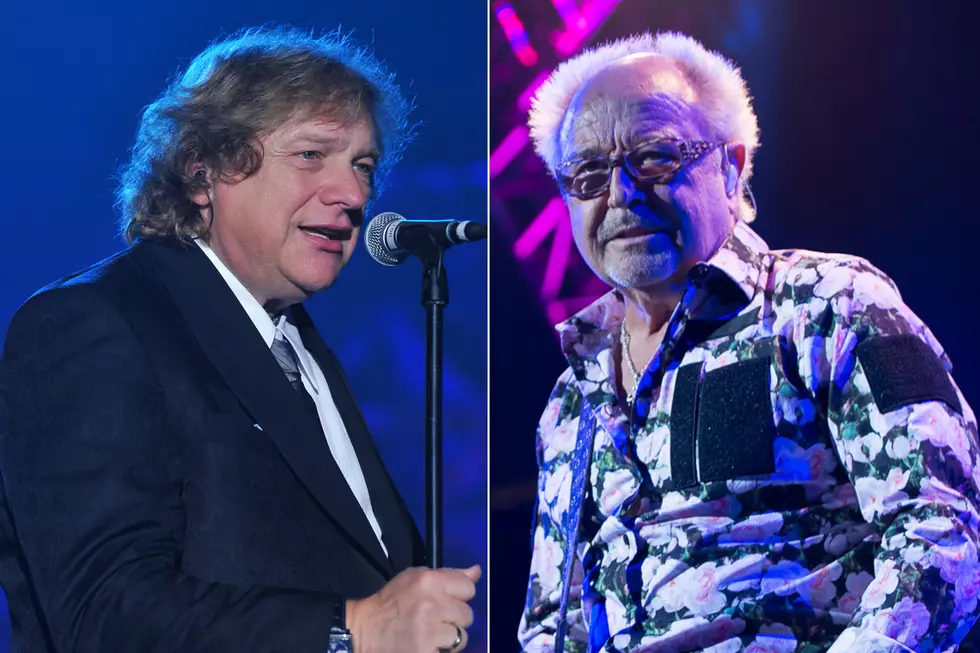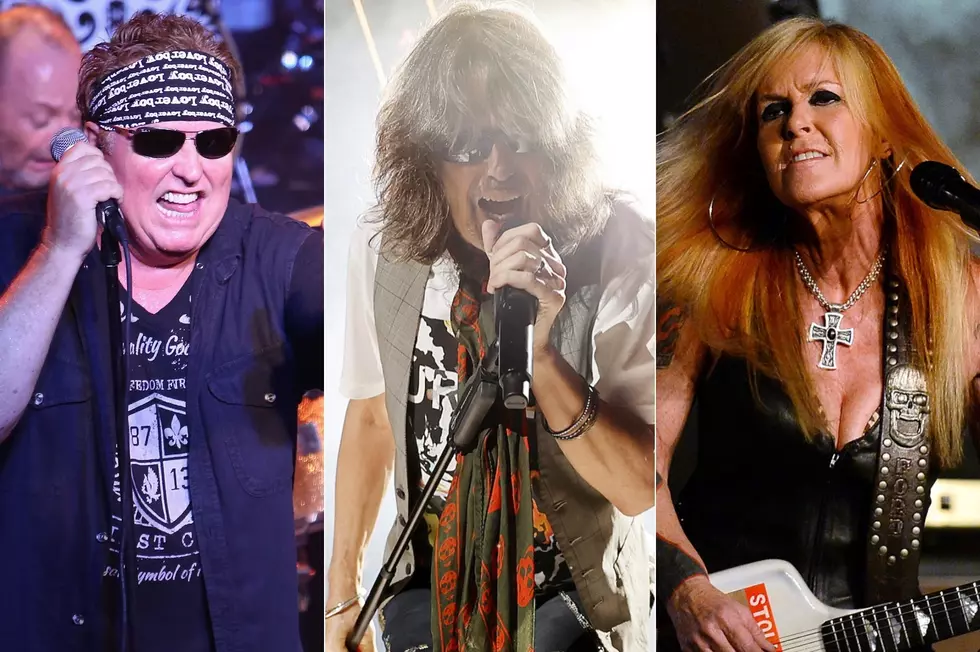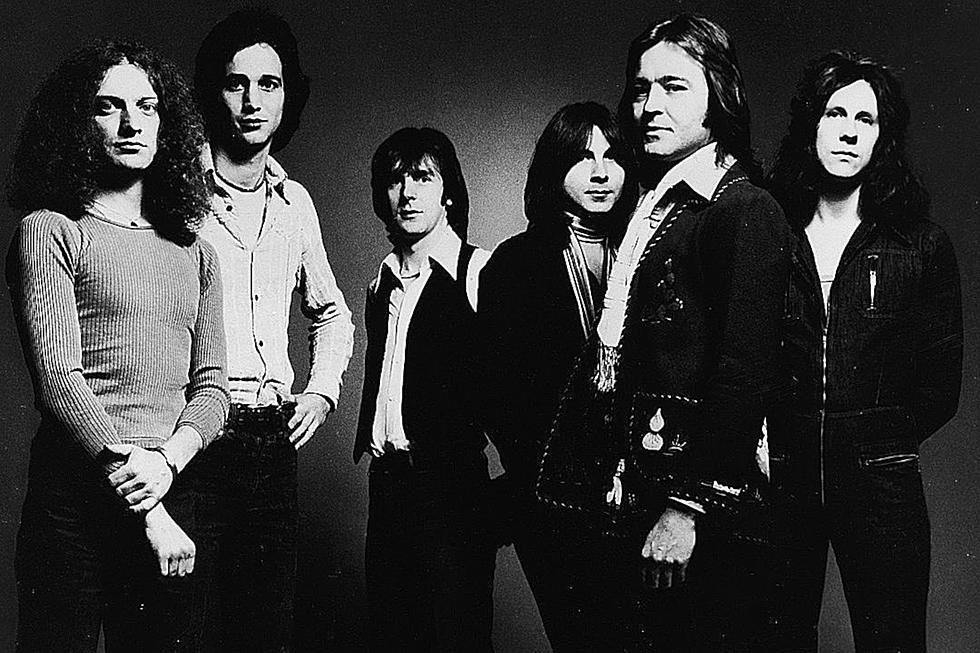
Lou Gramm on Upcoming Foreigner Reunion Show: ‘I Think It’s Going To Be A Lot Of Fun’
This month, the shared songwriting legacy of Lou Gramm and his former Foreigner bandmate Mick Jones will be feted as the pair are inducted into the Songwriters Hall of Fame.
They’ll be in good company with a class of inductees that also includes Aerosmith’s Steven Tyler and Joe Perry and Eagles associate J.D. Souther, among others. Gramm is taking stock of his own personal history with the release of his new autobiography ‘Juke Box Hero: My Five Decades In Rock ‘N’ Roll.’ Written in collaboration with writer Scott Pitoniak, the new book covers all eras of Gramm’s life, including his glory years with Foreigner, his subsequent solo work and his personal struggles with drug addiction and a life-threatening brain tumor.
We had the chance recently to sit down with Gramm to talk about the new book and his songwriting partnership with Jones. We also got his thoughts on a few random tracks from the Foreigner catalog.
Congratulations on your upcoming induction into the Songwriters Hall of Fame. That has to be a pretty cool feeling after all of these years.
Oh yeah, it’s a serious honor. I’ve taken a look at some of the people that are in that and it’s high end.
You’ve had various writing partnerships over the years, but the one with Mick seems like it was especially productive. What made that one work so well?
Well I think initially it was that basically he is a riff rock guitar player. He would play one riff after the other and there were so many of them that were great basic hooklines for a rock song that I would be able to find one through listening cassette tapes of his and just build on it from there.
There have been so many rock and roll books in recent years. What convinced you that the time was right to put your story down?
Well I just think that I’ve been thinking about it for a while. I don’t know whether it’s age or just that I feel like I’ve got a lot to talk about. Nobody was prodding me into this, I felt it was a good time and fortunately I had a great person to write with.
Did telling these stories change your perspective on any events that maybe had been lacking closure?
It’s funny you should ask that. There were a few things that Scott would suggest that I go into detail a little more about. As I would talk about it, it kind of did make me change the intensity of which I always thought of a certain incident and realize that it was just the circumstances -- it wasn’t really anything real personal -- it was just the circumstances [at that time]. There were times where it did soften my otherwise hardened approach on certain incidents.
How did you connect with Scott and what was the process of working on this book with him?
I met Scott through a mutual friend socially first, and then he asked me out to lunch and we had a meeting that was a little bit more focused on the actual possibility of writing this book together. The idea of it really appealed to me and we more or less just set up the groundwork and then we just started plugging away at it. It was great because Scott didn’t do things in chronological order. We would meet once a week for about three or four hours and he would just come with particular questions for me and they could have been questions from the last five years that I was with Foreigner or the first 20 minutes. He would ask questions that he really needed answers to and then put it in the storytelling form at a later point.
Did he talk to anybody else to fill in additional background and spur additional thoughts for material?
Not necessarily. He did have a couple of sources of his own that knew me [back then] and were in the business. But he didn’t like talk to me and then go talk to Mick or Foreigner’s drummer or anything. It was pretty much from my personal point of view and I think he would just get some facts from people to lay the background groundwork.
With your past illness that you had and some of the memory issues that came along with that, was he able to help with any memory gaps?
A little bit, yeah. For instance, I was pretty sure that after my operation [that] within a couple of months I was back on the road. It was actually about six months later I was on the road, although that’s not very long after having a large brain tumor removed, it was a little longer than I thought it was. He did put some definition to things that I didn’t have a perspective on.
Your illness reveals the complicated side of a band, where the corporation side really comes out. After your surgery, it seems like you probably would have been better off being at home, but instead, things moved ahead. Were you able to lobby at all to pause things instead?
I let management know that my doctor said that I should be doing next to nothing for a year and a half until there was substantial healing in that area and my cognizant thoughts and my memory was a little more accurate and in line. He didn’t think I should be out touring or for that matter, even singing. But it was about four months later that we were in Japan. I believe it says in the book that I had most of the lyrics to the songs written in black marker on white pieces of paper taped to the floor because I couldn’t remember the words to the old songs, let alone the newer ones.
I saw quite a few shows starting that year and in the years that followed. You were always giving 200% effort, but there were times where it was apparent it was a struggle. How difficult was it to go out onstage and do those shows? Because as the vocalist, you’re really exposed and although you were in a rebuilding process health-wise, it couldn’t have been easy for you to go out there at less than 100%.
It was demoralizing and downright frightening at points. Because you might be in a larger city where you know that the critics are normally after your scalp and they would take a situation like mine, definitely see that I was at a disadvantage and make a horrible example of me.
There was probably also the element of not really knowing what was going to come out vocally.
That’s a given. My voice didn’t have the strength or dexterity that it had had. A lot of times I felt like I was in a dream sequence on 'Twilight Zone' or something. It didn’t feel like I was singing. I could hear myself and I could hear the band but none of it felt very real to me. Really the bottom line is that I shouldn’t have been doing that. But management said, “Oh well look, we postponed the Japanese tour when you went in for surgery. We had to reschedule it and this is when we rescheduled it for." I said “but my doctor said that I shouldn’t be doing any of this for approximately a year or a year to a year and a half after the operation, this is not right that I’m doing this.” “Well, you don’t want any lawsuits against us, do you?” It kind of puts the finger on me as being the one that has put the band in a threatening position.
Admirably, you stayed out there in full view during that entire rebuilding process and never really stopped doing shows. Creatively, what did it take for you to work past all of this and get to where you are now?
It really took time. Because of the massive steroids, I put on over a hundred and twenty pounds. It was difficult to deal with, because I abhorred my own appearance and because of the massive steroids I was taking, it wasn’t like any amount of exercise or dieting would avail me of that situation. It was there and that was it. It wasn’t until four or five years later that the doctors cut back on the steroids and I started dropping weight.
It’s been a little while since your most recent album of material came out with the Lou Gramm Band. Have you been working on anything new?
I’m not and it’s not that I’m in a creative dry spell. I have a lot of ideas and the guys and I do toss around ideas for new songs. It’s unfortunate, but the problem is that with the corporate takeover of music, there’s actually no creative outlet for these songs other than online. There’s no radio stations that would play a new song from a classic artist. They only want to play the old hits.
It sounds like it kills your desire to create as a result.
It does. I mean, if it’s just me creating for me, I feel I really need an outlet for that creativity and the ability to let the people that listen judge whether they like it or not. None of my songs ever reach that point. It’s like being strangled before they can be heard. It’s very frustrating, that’s for sure.
Do you look at the fact though that with the internet, you have a direct route to your fans that you could get music out that way if you wanted to just go direct and record songs here and there....or record an album and do it on your own?
I know that ability is there. It’s quite a bit quieter than rock radio but you’re right, it is an option.
I just wondered if you still have songs that you want to get out.
There are and I’m pretty sure we’re going to start working on some new songs, it’s just that after writing and recording and releasing the Lou Gramm Band album, it was obvious that it didn’t even have a chance. That kind of put me back on my heels a little bit. I just felt that I had to regroup.
And the music business itself is such an ever-changing thing that it’s hard to know some days what to do..
It’s true. The corporate record companies are barely a shadow of what they used to be. I remember going to Atlantic Records and they had six or seven floors of the particular building that they were in and the last time I went there was about seven years ago and they had one floor and half of the floor was empty. They had very few people working there and it didn’t sound like much was going on.
Can you talk about the discussions that you and Mick had about performing at the Songwriters Hall of Fame?
We spoke and it was a very cordial conversation and we congratulated each other on the award and decided what songs we were going to do and discussed [what we were going to do]. I think we’re playing them, it will be him and I and the house band at the award show. We’re going to rehearse the day before the show and soundcheck the day of the show and do it. I think it’s going to be a lot of fun.
There were a lot of years of no communication leading up to this. How hard was it to work past that and put it all aside to get back in touch?
I made the first phone call. I just called him and congratulated him on the award. I think he was taken aback a little bit, but he congratulated me and I think that kind of broke the ice. We went right into asking how each other’s kids are and then got right down to how we were going to approach our end of the music for the show.
I’d love to get your thoughts about a few songs. First, what about ‘Girl On The Moon’ from the ‘4’ album?
Well, I love that song. I think that’s a song that’s very underrated. It has a certain feel to it that it’s unique unto itself. It could have been a contender! It’s a beautiful song.
How about ‘Rev On The Red Line?’
That’s autobiographical. I think the song talks about never growing up and it’s a personal song. Some people get it and some people don’t get it. Even as we were writing it, I had to take Mick aside and explain to him what drag racing was. He just didn’t understand what I was talking about lyrically, so I had to enlighten him a little bit, because it’s purely Americana. Once he knew, I think he embraced the song a lot more.
Going back to the first album, ‘Long, Long Way From Home.’
That was the first song that Mick and I worked on when we started writing together. That’s a little slice of me leaving Rochester to come to the Apple in decay.
On the other end of things, what do you think of ‘Say You Will?'
That’s a great song. I think that’s just the song that asks the question to the girl to quit procrastinating and beating around the bush and just say it.
Has your view of the ‘Inside Information’ album changed in the years since that record was made? It seems like it was a turbulent time for you guys.
It certainly was. I still have very mixed emotions about the album. Coming off of 'Agent Provocateur,' I had hoped that we would take a little bit more time with our writing and make sure that we reestablished ourselves as the rock band that we intended to be. I think there were less rock songs and more pop songs on 'Inside Information.' The ones that did rock didn’t get much attention because it seemed that the record company was once again pushing the ballads.
More From Ultimate Classic Rock









